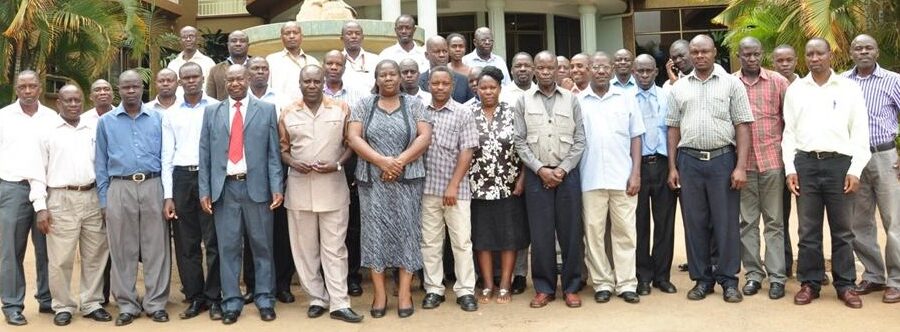A national SMP roll-out workshop for Uganda was held in Kampala, from 20th to 22nd July 2015. Its main aim was to roll-out ready Standard Methods and Procedures (SMPs) for FMD, PPR, RVF and brucellosis to veterinary stakeholders within Uganda to create awareness in order to foster smooth implementation of the SMPs. The workshop brought together key players in animal health service delivery mainly from the Ministry of Agriculture, Animal Industry and Fisheries (MAAIF). In addition, the workshop reviewed the status of livestock diseases and delivery of veterinary services in the districts and different zones in Uganda. A total of 57 participants drawn from Iganga, Jinja, Buikwe, Wakiso, Kampala, Luwero, Kamuli, Mukono and Kayunga districts attended the meeting. Others participants who attended the workshop were drawn from Midwestern, Western, Central I, Central II, Northern, South-Western, West-Nile, Eastern, South-eastern and Norther-eastern zones, MAAIF and AU-IBAR.
Dr Joseph Magona, on behalf of the Director, AU-IBAR, Prof. Ahmed Elsawalhy, stated that the SMP roll-out workshop was intended to disseminate ready SMPs, namely, FMD, PPR, RVF and brucellosis to all national stakeholders in order to initiate implementation at national level. Finally, he encouraged all livestock stakeholders in Uganda to adopt the implementation of the SMPs for FMD, PPR, RVF and brucellosis during implementation of disease control programmes and regulation of trade in livestock and livestock products. This he said, would improve the livelihoods of livestock keepers, which is an ultimate goal for the AU-IBAR.
In his official opening, Dr Nicholas Kauta, Director of Animal Resources (DAR) for Uganda, thanked AU-IBAR for the implementation of several programmes in Uganda. He noted that Africa only participates in less than 2% of global trade in livestock and livestock products due to little or no value addition to the animals and their products. He pointed out that trade was absolutely necessary for development. He appreciated the fact that the Standard Methods and Procedures in Animal Health (SMPAH) project benefits Uganda by supporting trade in livestock and livestock products. He advised participants to clearly understand the SMPs and implement them.
The workshop achieved the following:
- Capacity of field veterinarians in diagnosis of trade sensitive diseases discussed
- Improvement of surveillance of TADs in Uganda discussed
- Awareness on SMPs created among key stakeholder in Uganda
- A feedback mechanism for implementation of SMPs discussed
Proceedings
The workshop was conducted through presentations, plenary discussion and group work.
Overview of the SMP-AH Project
The presentation highlighted important aspects about the Standard Methods and Procedures in Animal Health (SMP-AH) project and the SMP concept. It pointed out that the project was aimed at harmonizing animal health approaches in the Greater Horn of Africa region, especially for prevention and control of trade-related ppriority diseases, including RVF, PPR, CBPP, CCPP, FMD, LSD, SGP, Camel pox and brucellosis.
Standard Methods and Procedures (SMP)
The presentations highlighted various components of the SMPs to the participants, including the Disease Control, Surveillance and Laboratory diagnosis components.
Feedback mechanism on the progress of implementation of SMPs
The discussion identified the roles of the Director of Animal resources, Regional Inspectors and District Veterinary Officers regarding the implementation of SMPs. It was agreed that the Director of Animal Resources would ensure SMPs were institutionalization and incorporated in day-to-day practice as a matter of policy in Uganda. The District Veterinary Officers and Regional Inspectors would supervise implementation of the SMPs and ensure that they provide regular feedback to the SMP-AH focal person in MAAIF. The focal person would in-turn send feedback to AU-IBAR.
Disease status and Control efforts in various districts and zones in Uganda
District Veterinary Officers and Senior Veterinary Inspectors shared their field experiences. FMD, CBPP, ASF, TBDs, NCD, LSD, Trypanosomosis, helminthiasis, Blackquarter, brucellosis and rabies ranked commonest among districts. Disease control strategies mainly targeted vaccinations, movement control and prophylactic and curative treatment. The services were mainly delivered by the Governmemnt Veterinary staff. However, in a few districts, Community Animal Health workers had been brought on board regarding disease monitoring and reporting.
Low staffing levels, inadequate vaccine supply, inadequate laboratory capacity, illegal animal movements, lack of transport, Quakerism, no-operational facilities, counterfeit drugs especially acaricides, inadequate disease reporting, poor quality and adulterated inputs especially animal feeds, animal thefts, rampant disease outbreaks, violation of laws, lack of holding grounds, uncontrolled livestock markets and porous borders were the common challenges districts faced.
Status of Veterinary Services in Uganda: Disease surveillance, control and reporting
Passive surveillance implementation and disease reporting were discussed. Standard questionnaire for disease reporting were filled in by districts latest every 15th of the next month. Databases in use included ARIS, EMPRES-I and Access. Mobile phone technology had been introduced for timely information sharing and reporting. Passive surveillance system had been assessment funded by DTRA. Active surveillance system and laboratory and data management systems were place. Major challenges for disease surveillance and reporting included late or non-reporting of diseases by farmers, inadequate staffing at districts and MAAIF, inadequate funding for district staff to conduct confirmation disease outbreak, inaccurate reporting and poor internet connectivity. There was need for technical backstopping of field staff on the use of ARIS in order to achieve use of ARIS at district
The Role of Livestock Identification and Traceability System in Disease Surveillance in Uganda
The presentation highlighted hot iron branding method that had been used in Uganda for animal breeding. Animal painting and tattooing was practised traditionally. Electronic identification had been piloted in Karamoja region to help curb the menace of cattle rustling. Lack of policy and effective legal framework; political opposition; low level of livestock owners awareness; high costs of inputs; illegal livestock movements in and across borders; lack of adequate resources for enforcement; limited infrastructure such as roads, crushes and recording database system; and lack of rapid alerts were the main challenges experienced.
Sharing of activity plan for 2015
The meeting discussed the implementation of the activities for the year 2015 including, roll-out of SMPs for implementation; creating a community grassroot disease reporting system; active surveillance on FMD, CBPP, RVF, PPR, Brucellosis, LSD and CCPP; Procurement of laboratory consumables, ICT equipment; Refresher training of laboratory staff and inspectors manning Border Posts; and implementation of awareness creation programmes to enhance disease control.
Developments of action plans for implementation of the SMPs
In groups participants discussed and scheduled key activities for achieving full roll-out of SMPs, including the workshop for development of the SMP implementation plan, zonal awareness workshops to promote SMP implementation, Institutionalization of SMPs in Policy, and reporting on the SMP implementation, including progress in utilization of SMPs, identification of shortcomings and emerging diseases requiring development of SMPs. An appropriate reporting format would be developed at country level. It was identified annual national review workshops on SMP implementation were necessary. This would then raise aspects to be considered during the annual regional review of SMPs by a Committee of Chief Veterinary Officers from implementing countries. AU-IBAR would organize the annual regional review workshop for SMPs. An action plan the developed to guide the implementation of the identified activities (see Annex 5.1)
Recommendations
Upon discussion on the afore-mentioned topics and pertinent concerns arising therein, the participants recommended the following:
To Government of Republic of Uganda (GOU) and AU-IBAR:
- To strengthen coordination and collaboration between the Veterinary Authorities of Uganda and the neighbouring countries in diseases surveillance and quarantine across the borders
- To support capacity building and public awareness creation in the area of veterinary regulation
- To support vaccination in cross-border areas, especially along the Uganda-Tanzania border (GOU to procure vaccines and AU-IBAR to provide logistical support under the SMP-AH project)
To GOU:
- To facilitate adoption and ensure implementation of the SMPs in Uganda.
- To ensure regular supply and availability of veterinary vaccines to enhance disease control
- To establish quarantine facilities meeting minimum standards at border check points and entry points
- To enhance provision of logistical support from the Ministry of Agriculture, Animal Industry and Fisheries (MAAIF) to districts and ensure collaboration and harmonization between the two by sharing information and building capacity of veterinary staff in surveillance and diagnostics
- To step up recruitment of veterinary staff in districts to improve the staffing levels
- To consider vaccine production as a long term strategy for disease control in the country
- To provide feedback on the success and challenges on the implementation of the SMPs and the syndromic manuals.
- Retooling of districts with computers to facilitate disease reporting
- Strengthen enforcement by recruiting agriculture police
- Consider value addition and organized marketing of livestock products in urban centers
- Strengthen mechanisms for surveillance data collection from research laboratory, private clinics and Makerere University
- To refresher train personnel manning Border Posts
GoU and neighbouring Member states
- To set up border post veterinary control points with equipment for laboratory testing and animal holding grounds
- To harmonize livestock health certification documents
Way forward
- SMP AH team to hold the workshop for development of the SMP implementation plan by August 2015
- SMPAH team to zonal workshops for awareness creation on the SMPs by September and October 2015
- SMPAH focal person and the Director-Animal Resources to ensure institutionalization of the implementation of SMPs in Uganda by December 2015
- Reporting on the implementation of the SMPs by districts to commence immediately and reports to be sent to the SMP-AH focal person by District Veterinary Officers by every 15th of the Month.
- SMP-AH focal person to send feedback reports of the implementation of SMPs every three months to the Co-coordinator of the SMP-AH project
Done this 22nd July 2015






